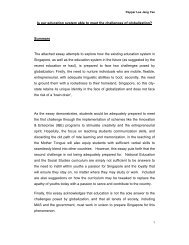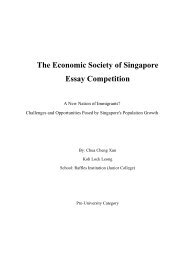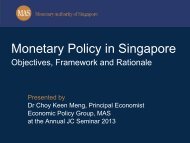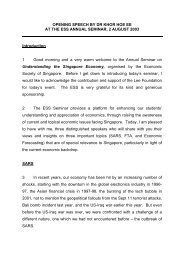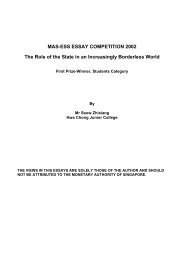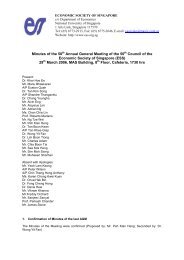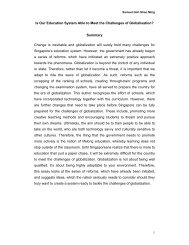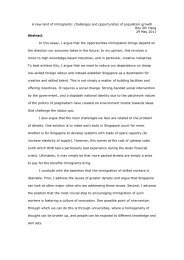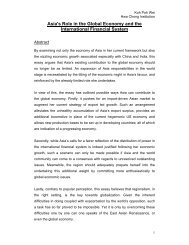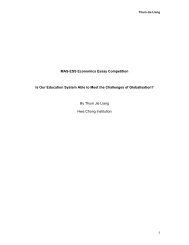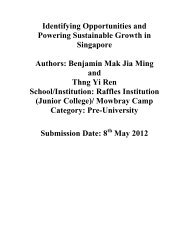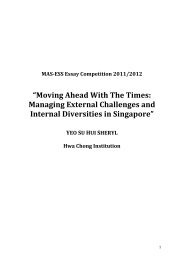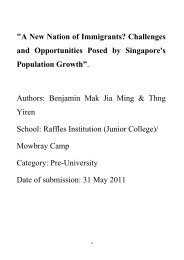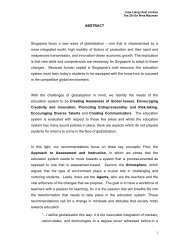the role of the state in an increasingly borderless world - Economic ...
the role of the state in an increasingly borderless world - Economic ...
the role of the state in an increasingly borderless world - Economic ...
- No tags were found...
Create successful ePaper yourself
Turn your PDF publications into a flip-book with our unique Google optimized e-Paper software.
Of course, this power shift is not entirely one-way traffic. As competition among MNCs<br />
or f<strong>in</strong><strong>an</strong>cial <strong>in</strong>stitutions <strong>in</strong>tensifies, <strong>an</strong> opportunity also emerges for recipient countries to extract<br />
ga<strong>in</strong>s by exploit<strong>in</strong>g <strong>the</strong>ir competition. However, <strong>the</strong> power shift towards mobile actors has been<br />
decisive on <strong>the</strong> whole. The global players have become stronger <strong>in</strong> enforc<strong>in</strong>g <strong>the</strong>ir logic <strong>of</strong><br />
accumulation upon <strong>the</strong> runn<strong>in</strong>g <strong>of</strong> <strong>the</strong> <strong>world</strong> economy while national governments have been<br />
under pressure to ch<strong>an</strong>ge <strong>the</strong>ir earlier practices <strong>of</strong> economic m<strong>an</strong>agement.<br />
3. The Role <strong>of</strong> <strong>the</strong> State <strong>in</strong> <strong>an</strong> Increas<strong>in</strong>gly Borderless Economy<br />
One ironic th<strong>in</strong>g about globalisation is that, as more <strong>an</strong>d more factors become mobile,<br />
national competitiveness is more critically dependent on less mobile factors, i.e., less globalised<br />
ones. Among o<strong>the</strong>r factors[MC1], <strong>the</strong> national government is arguably <strong>the</strong> most immobile one<br />
(we c<strong>an</strong>not move <strong>the</strong> S<strong>in</strong>gapore<strong>an</strong> government to Jap<strong>an</strong>, for <strong>in</strong>st<strong>an</strong>ce). In this respect, <strong>the</strong> <strong>role</strong><br />
<strong>of</strong> <strong>the</strong> <strong>state</strong> becomes more import<strong>an</strong>t with <strong>the</strong> fur<strong>the</strong>r progress <strong>of</strong> globalisation, contrary to <strong>the</strong><br />
popular perception that it should be dim<strong>in</strong>ished as <strong>an</strong> economy becomes globalised. 6<br />
Underly<strong>in</strong>g this observation is <strong>the</strong> fact that <strong>the</strong> <strong>state</strong> is <strong>the</strong> ultimate system m<strong>an</strong>ager <strong>of</strong><br />
<strong>the</strong> national economy, which is responsible for provid<strong>in</strong>g mobile actors with ‘complementary<br />
assets’. In determ<strong>in</strong><strong>in</strong>g <strong>the</strong> location <strong>of</strong> production or provision <strong>of</strong> f<strong>in</strong><strong>an</strong>cial resources, <strong>the</strong> mobile<br />
actors consider ‘location-specific factors’ which will complement <strong>the</strong>ir own assets. 7 If locationspecific<br />
factors <strong>of</strong> a country are not adequate, mobile actors do not come to, or leave, <strong>the</strong><br />
country. The character <strong>an</strong>d quality <strong>of</strong> location-specific factors, which are by def<strong>in</strong>ition less<br />
mobile, determ<strong>in</strong>e <strong>the</strong> ‘stick<strong>in</strong>ess’ <strong>of</strong> mobile assets.<br />
Among <strong>the</strong> location-specific factors, <strong>the</strong>re are certa<strong>in</strong>ly non-m<strong>an</strong>-made factors like<br />
natural resources <strong>an</strong>d geographic position, upon which national governments c<strong>an</strong> hardly exert<br />
<strong>an</strong> <strong>in</strong>fluence unless <strong>the</strong>y attempt to ch<strong>an</strong>ge territorial boundaries. Earlier FDI by MNCs <strong>in</strong> <strong>the</strong><br />
late 19 th <strong>an</strong>d early 20 th century were <strong>in</strong> fact heavily related with <strong>the</strong> extraction <strong>of</strong> natural<br />
resources. 8 In <strong>the</strong> current <strong>state</strong> <strong>of</strong> <strong>the</strong> <strong>world</strong> economy, however, m<strong>an</strong>-made location-specific<br />
factors like policy, <strong>in</strong>stitutions, <strong>in</strong>frastructures <strong>an</strong>d so on, are far more import<strong>an</strong>t <strong>in</strong> locational<br />
decisions made by mobile players. 9 With<strong>in</strong> a given territory, <strong>the</strong> <strong>state</strong> is <strong>the</strong> pr<strong>in</strong>cipal agent<br />
responsible for provid<strong>in</strong>g <strong>the</strong>se m<strong>an</strong>-made complementary assets to attract mobile assets.<br />
A basic assumption <strong>in</strong> <strong>the</strong> popular perception that <strong>the</strong> <strong>role</strong> <strong>of</strong> <strong>the</strong> <strong>state</strong> should be reduced<br />
<strong>in</strong> <strong>the</strong> era <strong>of</strong> globalisation is that market forces would replace or make unnecessary much <strong>of</strong> <strong>the</strong><br />
<strong>role</strong> previously undertaken by <strong>the</strong> <strong>state</strong> as <strong>an</strong> economy is more broadly exposed to forces <strong>of</strong><br />
globalisation. There are certa<strong>in</strong>ly some <strong>role</strong>s <strong>of</strong> <strong>the</strong> <strong>state</strong> that c<strong>an</strong> be substituted for by <strong>the</strong><br />
market. For <strong>in</strong>st<strong>an</strong>ce, if domestic comp<strong>an</strong>ies <strong>an</strong>d f<strong>in</strong><strong>an</strong>cial <strong>in</strong>stitutions grow sufficiently to raise<br />
foreign money with <strong>the</strong>ir own credit <strong>an</strong>d m<strong>an</strong>age f<strong>in</strong><strong>an</strong>cial risks by <strong>the</strong>mselves, m<strong>an</strong>y <strong>of</strong> <strong>the</strong><br />
<strong>state</strong>’s supports <strong>an</strong>d regulations over <strong>in</strong>ternational f<strong>in</strong><strong>an</strong>cial tr<strong>an</strong>sactions become redund<strong>an</strong>t.<br />
However, <strong>the</strong>re are also o<strong>the</strong>r import<strong>an</strong>t functions that only <strong>the</strong> <strong>state</strong> c<strong>an</strong> undertake. For<br />
<strong>in</strong>st<strong>an</strong>ce, policy formulation <strong>an</strong>d implementation is one <strong>of</strong> <strong>the</strong> <strong>state</strong>’s unique responsibilities,<br />
6 The follow<strong>in</strong>g is <strong>an</strong> example <strong>of</strong> this view: “... a major feature <strong>of</strong> concentration <strong>an</strong>d centralisation <strong>in</strong> late capitalism is<br />
its <strong>in</strong>ternational scale, which makes most nation <strong>state</strong>s relatively <strong>in</strong>signific<strong>an</strong>t elements with<strong>in</strong> <strong>the</strong> operation <strong>of</strong> a <strong>world</strong><br />
economy dom<strong>in</strong>ated by a small number <strong>of</strong> comp<strong>an</strong>ies which are larger <strong>an</strong>d more wealthy th<strong>an</strong> m<strong>an</strong>y <strong>in</strong>dividual <strong>state</strong>s<br />
(Johnston 1982: 61).<br />
7 Refer to Dunn<strong>in</strong>g (1988; 1997)<br />
8 In a similar ve<strong>in</strong>, imperial aggressions dur<strong>in</strong>g this period had to do with competition among nations to secure nonm<strong>an</strong>-made<br />
location-specific adv<strong>an</strong>tages around <strong>the</strong> globe.<br />
9 Even <strong>in</strong> <strong>the</strong> case <strong>of</strong> natural resource-seek<strong>in</strong>g FDIs, it requires a stable bus<strong>in</strong>ess environment <strong>an</strong>d <strong>in</strong>frastructure for<br />
extraction <strong>an</strong>d delivery <strong>of</strong> natural resources, which are part <strong>of</strong> m<strong>an</strong>-made location-specific factors.<br />
16



